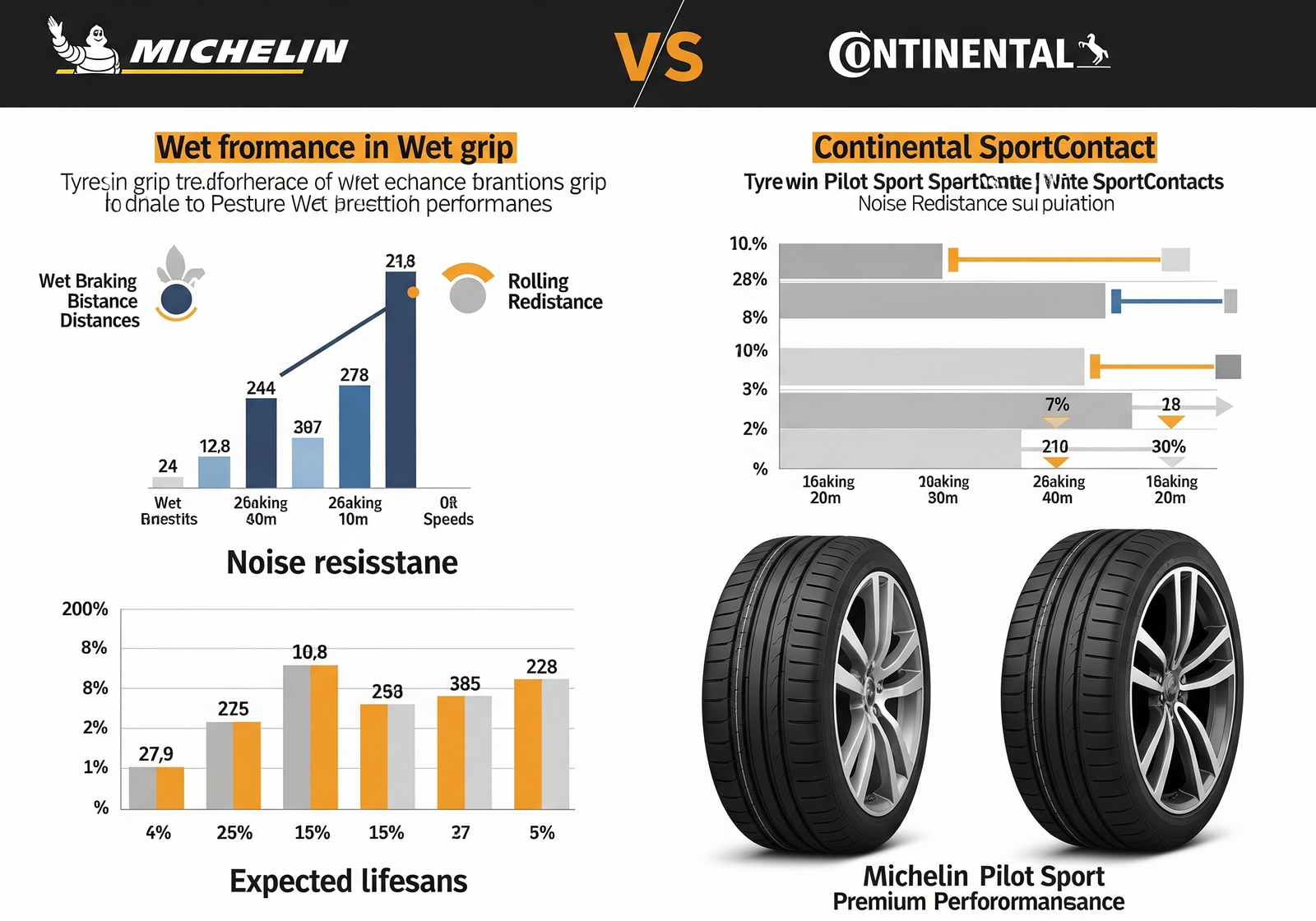So you’re thinking about getting new tyres and the big names keep popping up: Michelin and Continental. If you’re in the UK, you’ve probably seen both brands everywhere—from garages and dealerships to online tyre shops. But when it comes to making that final choice, which one really delivers the better performance?
This isn’t going to be one of those overly technical, jargon-filled writeups. Nope—we’re diving into Michelin vs Continental Tyres UK in a real, down-to-earth way. We’ll look at what matters most to regular drivers: wet grip, noise, and longevity. These are the things you’ll notice every day when you’re on the road, whether you’re commuting in rain, cruising down a motorway, or just trying to make your tyres last more than a few seasons.
Starting with the Basics: Who Are They?
Before we compare, let’s quickly look at who these brands are. Michelin is a French tyre company known for making high-quality, durable tyres. They’re also famous for the Michelin stars in restaurants—but that’s a whole other story. Continental, on the other hand, is German and just as old-school when it comes to tyre innovation. They focus a lot on safety and tech. Both brands are considered “premium,” so you’re already dealing with the best of the best here.
Wet Grip: The UK’s Most Important Tyre Feature?
If you live in the UK, wet grip is one of the most important things to look for in a tyre. Let’s face it—it rains a lot. Wet roads mean longer braking distances, more skidding, and less control.
Now, if we’re talking Michelin vs Continental Tyres UK in terms of wet grip, Continental often has the edge. Many drivers (and even independent tyre tests) have said that Continental tyres handle better in the rain, especially the Continental PremiumContact 7 and EcoContact 6. They stick to the road like glue, giving you that extra confidence when you’re driving through a downpour.
That said, Michelin isn’t exactly slacking off. Their Michelin Primacy 4 and CrossClimate 2 are excellent in wet conditions, too. They’ve got that unique tread design that pushes water out from under the tyre, reducing the risk of hydroplaning. So, while Continental might slightly win in wet grip, Michelin still puts up a good fight.
Tyre Noise: The Hidden Annoyance
Ever noticed that hum or roar when you’re driving on the motorway? That’s tyre noise, and it can be a real pain—especially on longer drives. It’s not something people think about when buying tyres, but once you drive on a noisy set, you’ll regret not checking first.
In the battle of Michelin vs Continental Tyres UK, Michelin often takes the win when it comes to low noise. Their tyres are engineered to give you a smoother, quieter ride. The Michelin Primacy 4 is especially good here—it’s known for being almost silent on the road.
Continental tyres are fairly quiet too, but they can sometimes be a bit louder, especially after a few thousand miles. It’s not deal-breaking, but if a quiet cabin is high on your list, Michelin might be your best bet.
Longevity: Which One Lasts Longer?
Tyres are expensive. So obviously, you want them to last as long as possible. This is where longevity comes into play, and Michelin really shines here. Across the board, their tyres are known to last longer—sometimes thousands of miles more than their rivals. The Michelin Energy Saver+ is a beast when it comes to tread life.
Continental tyres, on the other hand, offer solid performance early on, but some models tend to wear out quicker. That doesn’t mean they’re low-quality—far from it. They’re just often made for performance over endurance. So if you’re someone who drives a lot or keeps cars for longer periods, Michelin tyres might give you better bang for your buck in terms of longevity.
Price: Let’s Be Honest
Both brands are premium, so you’re not going to find any major bargains here. But when comparing Michelin vs Continental Tyres UK, Michelin tyres can sometimes be just a bit more expensive. You’re paying for the longer lifespan and that smoother ride. Continental, while slightly cheaper in some models, often gives better wet grip out of the box.
It all comes down to what you prioritise. Want tyres that last longer? Go Michelin. Want tyres that grip the road like crazy when it’s pouring? Continental might be the better value.
Real-World Experience: What Drivers Say
A lot of UK drivers have shared their thoughts online, and the feedback is pretty split. Some swear by Michelin for their quietness and durability. Others won’t use anything but Continental, especially those who live in places where rain is the norm.
One thing’s for sure: both brands are widely trusted, and you won’t be making a “bad” choice either way. It’s more about matching the tyre to your driving style and conditions.
Summary: Michelin vs Continental Tyres UK – Final Thoughts
So, after all that, here’s how it stacks up:
| Feature | Winner |
|---|---|
| Wet Grip | Continental (slight edge) |
| Noise | Michelin (quieter ride) |
| Longevity | Michelin (longer lasting) |
| Price | Continental (slightly cheaper) |
If you’re someone who drives mostly in rainy cities and wants excellent wet handling, Continental tyres might be your go-to. If you do a lot of motorway driving or care about tyre life and cabin noise, Michelin could be the smarter choice.
Bottom line? When it comes to Michelin vs Continental Tyres UK, it’s not about which brand is better overall. It’s about which one fits your daily driving needs best.
Bonus Tip: Don’t Ignore the Labels
When shopping, look at the EU tyre labels. They’ll show you exactly how the tyre scores in wet grip, noise, and fuel efficiency. It’s a quick way to compare models side by side without relying only on brand reputation.

